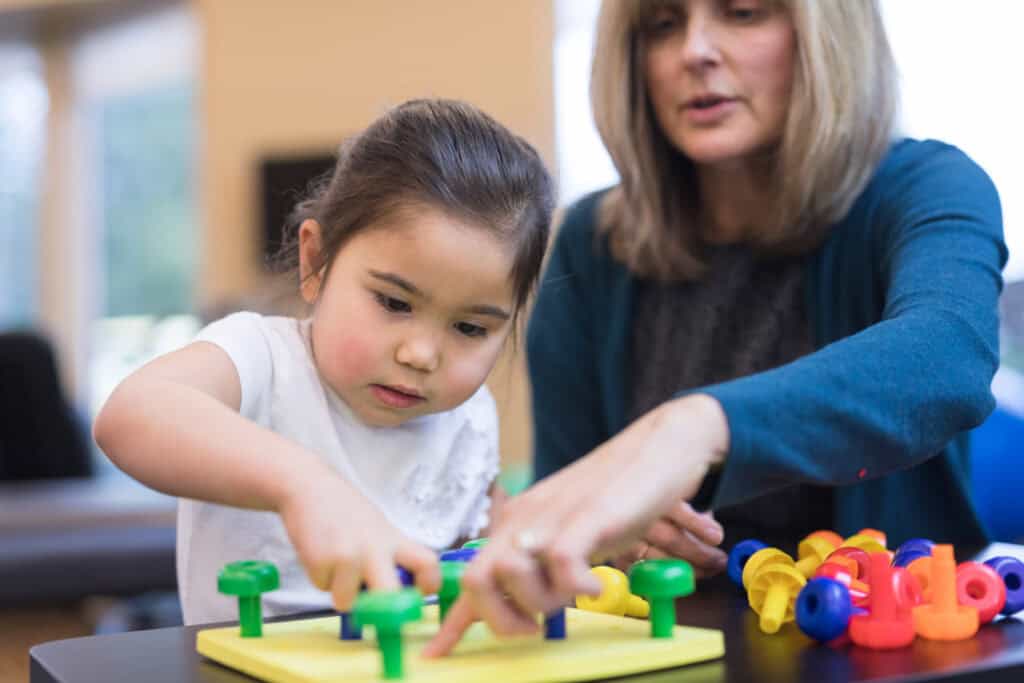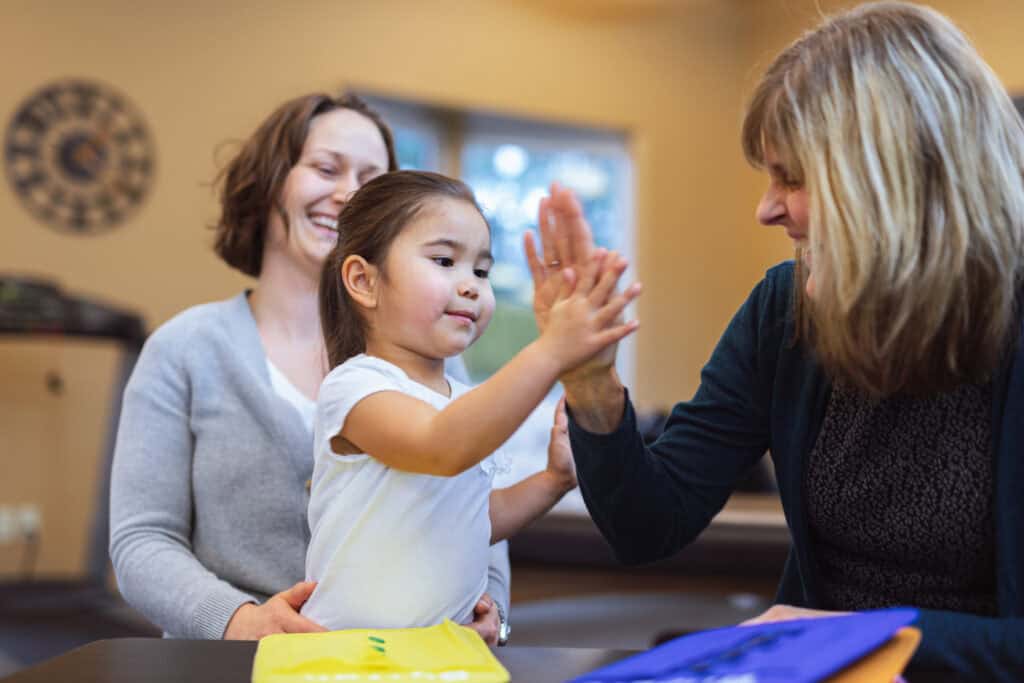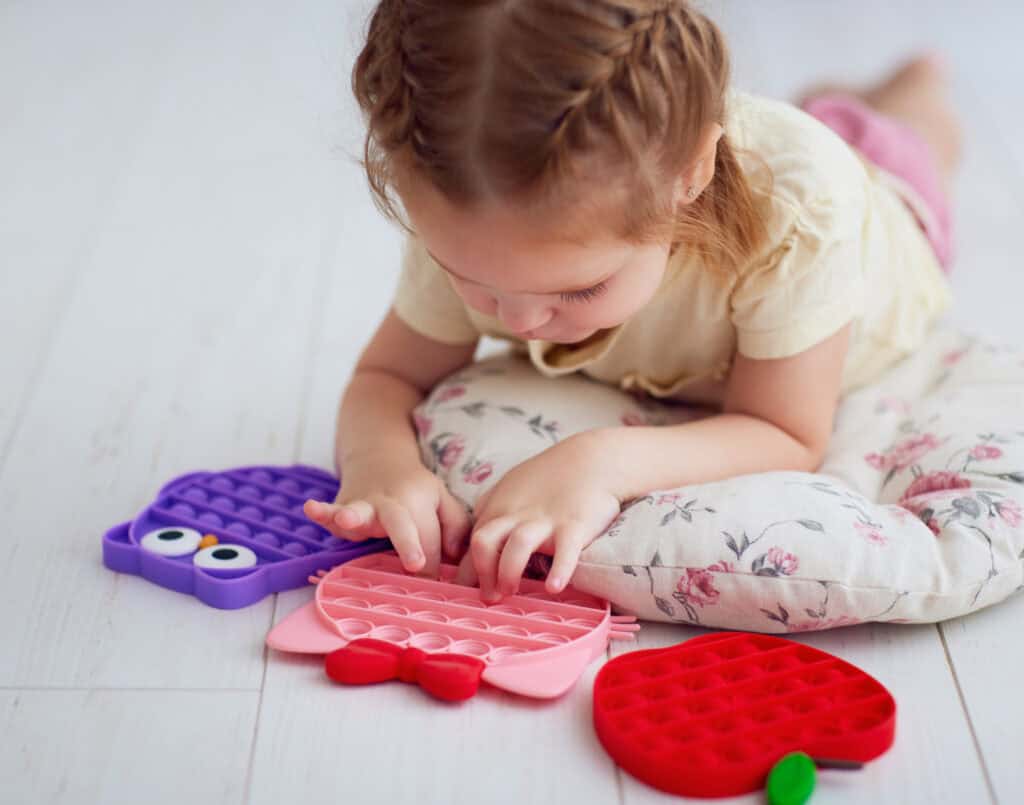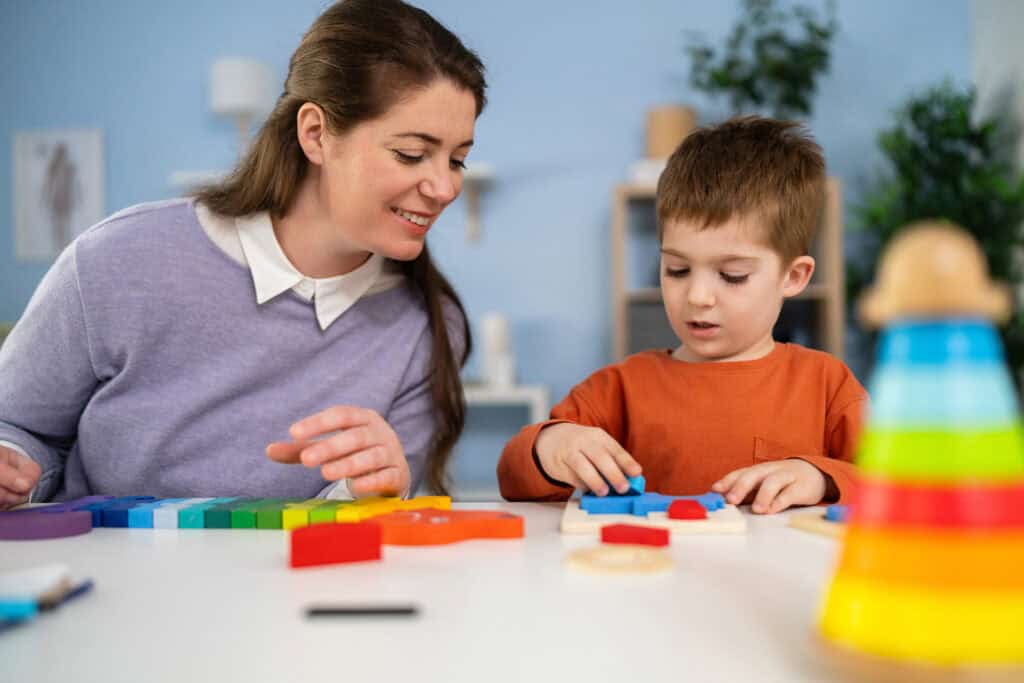Preparing Your Child for the Real World of School and Play

There are many different approaches to pediatric therapy. But in our experience, the best approach is one that closely approximates a child’s real world to prepare them for situations they will face in daily life. At No Limits Pediatric Therapies in Bentonville, AR, our goal is to equip children with the skills they need to thrive in their everyday environments. Today, I want to discuss how we prepare your child for the real world of school and play. The Logic Behind an Open Gym and Therapy Areas Children don’t spend most of their lives in small rooms, so treatment in confined spaces isn’t as beneficial as treatment in environments that mimic their natural surroundings. That’s why we utilize large, open spaces for our therapy sessions. This approach ensures that children work on their developmental goals in settings that resemble the real world. Open gyms with unpredictable changes, due to other children also receiving therapy, better approximate the environments children will face outside of therapy. This gives them a greater chance of applying what they learn in therapy to their daily lives. While we do have smaller, individual treatment rooms for children who are just getting started with therapy, our goal is to build them up to the ability to handle working in our open gym. An Alternating Schedule of Therapists Helps Children Prepare for School Some clinics keep children with one dedicated therapist throughout their treatment. However, we intentionally change which therapist works with a child during their treatment. This strategy helps children become comfortable working on therapy and using their skills regardless of who is assisting them. It also helps them adapt to different teaching styles and authority figures, making it easier for them to listen to and interact with their teachers at school. A Child’s Life Will Soon Happen in Large Rooms Around Many People The combination of a large gym where multiple therapy sessions are occurring simultaneously and a revolving cast of therapists working with your child is key. This is because it helps them learn to navigate busy environments like schools, grocery stores, and other public places. By practicing their skills in these dynamic settings, children can build the confidence and adaptability needed to handle real-world situations. Open Gyms Provide Social Skills as Well as Academic Skills Working in an open gym helps children develop key academic skills such as focusing despite any environmental distractions. It also provides opportunities to practice social skills with other children who are also receiving therapy. These interactions are invaluable, as they help children learn to share, take turns, and communicate effectively with peers, all of which are essential skills for school and life. Reach Out to No Limits for an Evaluation If you’re interested in how No Limits Pediatric Therapies can help your child prepare for the real world, call us at (479) 250-9838 for a free 15-minute developmental consultation. Let’s work together to help your child grow beyond their limitations and thrive in all areas of life. About Terrica Terrica Weatherford, MSOT, founded No Limits Pediatric Therapies in 2016. She earned her Master of Science in Occupational Therapy from the Medical University of South Carolina in 2012. For over 13 years, Terrica has been committed to helping neurodiverse children (and those who need extra support) reach their full potential. She founded her practice to ensure she could provide exceptional care for children and their families.
The Difference Between Private and In-School Therapy

A common question we hear from parents is why their child should receive clinic-based therapy if they are already receiving school-based treatment. There are several reasons why private care outside of school might be beneficial for your child, which is what we’ll cover here. At No Limits Pediatric Therapies in Bentonville, AR, our mission is to support children in overcoming their developmental challenges and reaching their full potential. Today, I want to explore the differences between private and in-school therapy and why private care might be the best option for your child. Private Care Can Offer Much More Intensive Therapy School-based therapy is often limited in scope and duration. Many children receive limited time per month, and this may not always be provided one-on-one. This limit on how much time your child can even receive therapy makes it difficult for them to build their skills effectively, as they might not have enough time to practice. Now, that’s not on the school-based therapists at all, that’s how therapy programming works in most public school systems in the United States. But because of that time limitation, many children struggle to achieve their developmental milestones even with school-based therapy. Private care, on the other hand, has less limitations. We can see your child outside of school as often as they need in order to help them build their developmental skills for success in life. The Private Clinic Approach Is Much More Holistic School-based therapy focuses on equipping children with the skills they need to participate in their education. This means that the school’s therapist can only help your child with the specific skills necessary to a classroom environment like focusing, handwriting, or navigating their school environment. But private care is able to adopt a more holistic approach. Clinic-based pediatric therapy is personalized to address all areas of a child’s life. This includes not only academic skills but also self-care, social skills, play, and much more. By considering the whole child, we can provide a comprehensive treatment plan that helps them thrive in all aspects of their daily life, not just in the classroom. Private Therapy and School Therapy Can Be Complementary It’s important to recognize the value of school-based therapy in helping children participate in their education. School-based therapists do their best to support each child within the constraints of the school environment and their respective program rules. However, for children who need more intensive support, complementing school-based therapy with private care can make a significant difference. This dual approach can help children succeed both at school and at home by providing them with the tools they need to grow in all areas of life. Reach Out to No Limits for an Evaluation If you’re curious to find out if private therapy can benefit your child, reach out to our team at No Limits Pediatric Therapies. We offer a free 15-minute developmental consultation to help determine if therapy is the right step for your child. Call us today at (479) 250-9838 to schedule your consultation and take the first step towards helping your child achieve with no limits. About Terrica Terrica Weatherford, MSOT, founded No Limits Pediatric Therapies in 2016. She earned her Master of Science in Occupational Therapy from the Medical University of South Carolina in 2012. For over 13 years, Terrica has been committed to helping neurodiverse children (and those who need extra support) reach their full potential. She founded her practice to ensure she could provide exceptional care for children and their families.
Baby Seats and Toys: Which Are Best for Your Baby?

Parents are constantly inundated with ads and recommendations for the latest and greatest baby gear and toys. There’s so much out there that it can be difficult to know what is good for your baby, what’s just okay, and what can actually be harmful to their development. At No Limits Pediatric Therapies in Bentonville, AR, our goal is to help children reach their full potential through expert care and personalized treatment plans. In this blog post, I want to talk about the best practices for using baby seats and toys to support your baby’s development based on my experiences as a pediatric occupational therapist. The Drawbacks of Baby Seats and Walkers Many parents rely on carriers, swings, bouncers, and walkers to safely hold their child while handling other tasks. While these containers can be convenient, spending too much time in them can negatively affect your baby’s development. Common conditions that can arise from excessive use of baby seats and walkers include toe-walking, poor coordination, and torticollis. These issues occur because the containers restrict natural movement and limit the baby’s ability to explore and develop their motor skills. Babies Benefit from Exploring Their Environments Without Being Contained We don’t want to restrict a baby’s movements because that prevents them from experiencing the full range of sensations in their environment. Instead, we recommend parents provide ample tummy time and ensure they have a safe space for babies to move around and explore. Not only is this more interesting for the baby, but it can lead to significant developmental benefits. Free movement helps babies process more sensory input, improve foot and arch development, and gain better control and awareness of their bodies. These foundational skills are crucial for many other developmental milestones. Choose Safe, Non-Toxic Toys and Household Objects While baby seats and walkers may seem like a safe option, baby-proofing your home (or specific areas of your home) is a better choice for promoting exploration and development. Think of it this way: would you rather be stuck sitting in a chair all day, or would you prefer to move around and find something to do? Another common question I hear from parents is what types of toys are best for baby’s development. I always recommend you consider the materials and safety of the items. Many plastic toys can be made with unsafe materials, which can post a risk when babies inevitably put them in their mouths. I recommend parents choose toys made from cloth and/or wood, which are generally safer and less likely to contain harmful chemicals. Ensuring that the toys are non-toxic and free from small parts that can be swallowed is essential for your baby’s safety and overall wellbeing. Reach Out to No Limits for an Evaluation If you have concerns about your baby’s development or want to ensure they are on the right track, reach out to No Limits Pediatric Therapies. Our team of skilled therapists is here to help your child grow beyond their limitations. Call us at (479) 250-9838 for a free 15-minute developmental consultation to find out if your child might benefit from pediatric therapy. Together, we can support your baby’s growth and development so they can reach their fullest potential. About Terrica Terrica Weatherford, MSOT, founded No Limits Pediatric Therapies in 2016. She earned her Master of Science in Occupational Therapy from the Medical University of South Carolina in 2012. For over 13 years, Terrica has been committed to helping neurodiverse children (and those who need extra support) reach their full potential. She founded her practice to ensure she could provide exceptional care for children and their families.
Early Signs of Developmental Delays and How to Find Help

While it’s true that children often develop at their own pace, there are key milestones to watch out for as your baby grows to ensure they’re on the right track. If you’ve ever wondered if your child is simply a late bloomer or if they need extra support, we’re here to help. At No Limits Pediatric Therapies in Bentonville, AR, our mission is to support children in overcoming their developmental challenges to reach their full potential. Today, I want to discuss the early signs of developmental delays and how to find the help your child may need. What Are Developmental Milestones? Developmental milestones are specific skills or behaviors that most children can do by a certain age. These milestones are used by healthcare professionals and parents to track a child’s growth and development. They include a range of abilities such as motor skills, speech and language, social interactions, and cognitive development. When a child is not meeting these milestones, it may be an early sign that they need additional support to reach their full potential. Different ages have their own unique milestones. It’s important to track these to ensure your child is gaining the skills they need for success in life—and to know when they might need extra support. Examples of Developmental Milestones for a One-Year-Old For a one-year-old, some common developmental milestones include: Saying single words like “mama” and “dada” Standing and possibly taking a few steps without holding on Waving “bye-bye” and shaking head “no” Exploring objects in different ways, like shaking, throwing, or tasting Examples of Developmental Milestones for a Two-Year-Old For a two-year-old, some common developmental milestones include: Using two- to four-word sentences Recognizing names of familiar people and objects Kicking a ball and beginning to run Pointing to things or pictures when they are named Examples of Developmental Milestones for a Three-Year-Old For a three-year-old, common developmental milestones include: Speaking in short sentences (three to four words) Following simple instructions Running and climbing with ease Playing with other children and taking turns Showing a wide range of emotions (happy, sad, angry) These Milestones Also Help Parents Advocate for Their Child Being aware of developmental milestones for your child’s age is crucial. By keeping track of which milestones your child has or has not attained, you can effectively advocate for them at school, the doctor’s office, and in other environments. This knowledge can give you a strong leg to stand on when you are seeking extra support for your child to help them succeed. If Your Child Is Missing Multiple Milestones, Request a Referral from Your Pediatrician If you notice your child is missing multiple milestones, you should seek a referral from your pediatrician. Pediatricians can refer children to pediatric therapy clinics like No Limits for a comprehensive evaluation. And if you run into any trouble, we can always assist you in seeking a referral to ensure your child can access the therapy services they need. Reach Out to No Limits for an Evaluation If you’re concerned about your child’s development, call us at No Limits Pediatric Therapies at (479) 250-9838 for a free 15-minute developmental consultation. Our team can help you determine if pediatric therapy is recommended and provide the necessary support to help your child grow beyond their limitations. About Terrica Terrica Weatherford, MSOT, founded No Limits Pediatric Therapies in 2016. She earned her Master of Science in Occupational Therapy from the Medical University of South Carolina in 2012. For over 13 years, Terrica has been committed to helping neurodiverse children (and those who need extra support) reach their full potential. She founded her practice to ensure she could provide exceptional care for children and their families.
Kids & Trauma: Specialized Care Improves Trauma Recovery

It’s an unfortunate truth that some children have experienced trauma early in their lives. But with the help of expert pediatric therapists, your child can get the developmental support they need in a way that respects what they have experienced and how that can impact their life. At No Limits Pediatric Therapies in Bentonville, AR, our mission is to support children in overcoming their developmental challenges and reaching their full potential. Today, I want to discuss the importance of specialized care for children who have experienced trauma and how trauma-informed care can significantly improve their recovery. What Is Trauma-Informed Care? Trauma-informed care in pediatric therapy refers to an approach that considers the unique needs of children who have experienced physical or emotional trauma. It involves recognizing and properly responding to the effects that trauma can have on a child’s development. Trauma-informed care focuses on the physical and emotional safety of children who have experienced a traumatic event. The goal is to create opportunities for children to rebuild a sense of control over their lives while working on their developmental goals. Many Children in Foster Care or Who Have Been Adopted Have a Special Need for Trauma-Informed Care Children who have been in the foster care system or those who have been adopted often have histories of physical or emotional trauma. These children can greatly benefit from pediatric therapy delivered by experts who are trained in trauma-informed care. This is because children who have experienced trauma face specific challenges beyond any developmental delays or other disabilities. By understanding these challenges, trauma-informed therapists can help children achieve their developmental goals in a supportive and safe environment. Making Children Feel Safe and Respected Is Vital Providing trauma-informed care means creating an environment where children feel safe and respected. This involves earning the child’s trust to effectively push them toward achieving their developmental goals. Key aspects of trauma-informed care include: Respecting your child’s bodily autonomy and individual choices Addressing any food insecurity by creating a safe environment around food Being mindful of the language used, as certain words or phrases can be triggering Ensuring that the child feels a sense of safety and security in all interactions with their therapist Trauma-Informed Care Can Be an Essential Part of a Child’s Pediatric Therapy Journey Children who have experienced trauma but who also need pediatric therapy to address developmental delays or disabilities can benefit immensely from working with a therapist who is well-versed in trauma-informed care. Whether your child needs physical, occupational, speech, or feeding therapy, our team can help with trauma-informed care. This specialized approach helps address the unique needs of children who have experienced trauma, supports their recovery, and empowers them to achieve their developmental goals. Reach Out to No Limits for an Evaluation At No Limits Pediatric Therapies, our therapists have specialized training in trauma recovery. If you believe your child could benefit from our services, call us at (479) 250-9838 for a free 15-minute developmental consultation. Let us help your child grow beyond their limitations and reach their full potential in a safe and supportive environment. About Terrica Terrica Weatherford, MSOT, founded No Limits Pediatric Therapies in 2016. She earned her Master of Science in Occupational Therapy from the Medical University of South Carolina in 2012. For over 13 years, Terrica has been committed to helping neurodiverse children (and those who need extra support) reach their full potential. She founded her practice to ensure she could provide exceptional care for children and their families.
The Remarkably Therapeutic Effects of Crawling

Did your child skip crawling and go straight to walking? While many parents think this is a sign of advanced development, it can actually pose problems for your child later on in life. This is because the natural progression of a baby’s movements from crawling to walking help them build key skills they need for more complex skills as they get older. At No Limits Pediatric Therapies in Bentonville, AR, our mission is to help children reach their fullest potential. Today, I want to share the incredible benefits of crawling and why this seemingly simple activity is so crucial for your child’s development. Babies Should Be Encouraged to Spend Time Crawling Before They Walk Crawling is a critical milestone in a child’s developmental journey. Most babies will go through a natural progression from rolling over, sitting on their hands and knees, crawling, standing, and then walking. This progression is the foundational support for the development of many of a child’s motor skills. Encouraging babies to spend time crawling helps build strength, coordination, and balance. This stage is essential for developing the muscles and motor patterns needed for more complex movements like walking, running, and jumping. When children skip any of these steps, it can prevent them from building the basic skills they need to achieve later developmental milestones. The Benefits of Crawling Are Far-Reaching The benefits of crawling are all a result of progressing through developmental movements in the proper sequence. This is because crawling helps integrate your child’s primitive reflexes, which are automatic movements that are crucial for development. When reflexes are integrated, it means that they stop being involuntary actions and come under your child’s own control. One of the most common reflexes is when you put your finger in a baby’s hand, and they grab it. This is automatic; but as they get older, it becomes an action they can choose to do or not do. Properly integrated reflexes, which happen in part thanks to crawling, lead to: Better attention and focus Improved learning skills Better handwriting Stronger core and shoulder muscles Enhanced coordination Children Who Miss Crawling May Need Physical Therapy Later on in Life Some children skip crawling altogether. They move straight from sitting to walking and excitedly run around to explore and play. While this might seem like a sign of advanced development, it can lead to physical challenges later on. Skipping crawling can result in weaker core muscles, poor coordination, and difficulty with fine motor skills. Many children who miss the crawling stage eventually need physical therapy to address these issues and to develop the strength and coordination they missed by not crawling. Thankfully, with expert support from pediatric therapists, these challenges can be overcome. Reach Out to No Limits for an Evaluation If you have concerns about your child’s development, don’t hesitate to seek professional advice. At No Limits Pediatric Therapies, our skilled therapists are here to help your child grow beyond their limitations. Call us at (479) 250-9838 for a free 15-minute developmental consultation to see if your child can benefit from pediatric therapy. About Terrica Terrica Weatherford, MSOT, founded No Limits Pediatric Therapies in 2016. She earned her Master of Science in Occupational Therapy from the Medical University of South Carolina in 2012. For over 13 years, Terrica has been committed to helping neurodiverse children (and those who need extra support) reach their full potential. She founded her practice to ensure she could provide exceptional care for children and their families.
Bad “Behavior”? Sensory Processing Might Be the Problem

Have you ever struggled to understand why your child behaves a certain way? This is a common concern that we hear from parents because many don’t know what they can do to get their child to behave properly. At No Limits Pediatric Therapies in Bentonville, AR, our mission is to support children in overcoming their developmental challenges and reaching their full potential. Today, I want to address a common issue many parents face: understanding what’s often behind their child’s bad behavior at home and at school. Behavioral Problems Are Often a Clue to Sensory Processing Difficulties Sensory processing refers to how the body’s nervous system receives and responds to sensory input. When a child has trouble processing sensory information, it can significantly impact their daily life and behavior. Have you ever had to get work done with some annoying noise in the background distracting you? Or maybe you needed to get sleep, but it was difficult due to lights, sounds, or the temperature of the room? While most adults are able to adjust their environment to suit their needs or push themselves to adapt to distractions, this is something that children with a sensory processing disorder struggle to do. Typical Signs of a Sensory Processing Disorder Some common signs of a sensory processing disorder can include: Hitting, biting, or other aggressive behaviors Difficulty following directions Trouble getting dressed or resisting certain types of clothing Challenges during mealtimes, such as picky eating or gagging Acting out or having frequent meltdowns Avoiding social interactions or being overly aggressive towards peers Difficulty transitioning between activities Being overly sensitive to lights, sounds, or textures Seeking excessive movement or rough play Difficulty focusing or sitting still Sensory Processing Difficulties Can Create a Crisis for the Whole Family When a child struggles with sensory processing, it can create significant challenges for the entire family. Dealing with meltdowns and bad behavior can take its toll on everyone at home, which is why we often hear parents say that they truly love their child, but sometimes they struggle to like their child. This is completely understandable, but without proper support, it can lead to more challenges for your family. Our main goal in addressing a sensory processing disorder is to figure out what in the environment is triggering your child. Then we work with you, the adult, to help modify the environment for your child. At the same time, we work with your child to improve how they respond when their environment gets overwhelming. Therapy That Includes Treatment for Sensory Processing Can Improve Results Pediatric therapy that addresses sensory processing difficulties can make a world of difference for both your child and your family. We are one of the few clinics in our area that does in-depth sensory assessments that give us a greater view of a child’s sensory processing challenges. We then have a set of proven sensory protocols that we use on children. This is a vital component of pediatric therapy because it helps us uncover the reasons why your child is reacting the way they are and work with them (and you) to handle the cause. With targeted therapy, children can learn to manage their sensory processing disorder better, which can lead to improved behavior and peace of mind for your whole family. Reach Out to No Limits for an Evaluation If your child struggles with behavior or emotional regulation, don’t hesitate to reach out to our team at No Limits Pediatric Therapies. We offer a free 15-minute developmental consultation to help determine if therapy is the right step for your child. Call us at (479) 250-9838 to schedule your consultation and take the first step towards helping your child overcome their sensory challenges today. About Terrica Terrica Weatherford, MSOT, founded No Limits Pediatric Therapies in 2016. She earned her Master of Science in Occupational Therapy from the Medical University of South Carolina in 2012. For over 13 years, Terrica has been committed to helping neurodiverse children (and those who need extra support) reach their full potential. She founded her practice to ensure she could provide exceptional care for children and their families.
Why Play-Based Therapy Can Result in Improved Outcomes

If your child has ever attended pediatric therapy, you’ve probably noticed that it looks a lot like playtime. But even though play-based therapy is a lot of fun, it is also a proven way to help children achieve their developmental goals. At No Limits Pediatric Therapies in Bentonville, AR, we provide comprehensive pediatric physical, speech, occupational, and feeding therapy to help children reach their full potential. Today, I want to discuss the benefits of play-based therapy and how it can lead to improved outcomes for children with developmental challenges. What Is a Sensory Processing Disorder? A sensory processing disorder (SPD) happens when the brain has trouble receiving and responding to information that comes in through the senses. Children with SPD may be over-sensitive or under-sensitive to sensory input. Over-sensitivity can result in extreme reactions to everyday stimuli, like loud noises or bright lights. Under-sensitivity may lead to a lack of response to these same stimuli. Both types of sensitivity are signs of a sensory processing disorder and can significantly impact a child’s daily life. How Does a Sensory Processing Disorder Affect a Child’s Life? Children with sensory processing disorders can face a variety of challenges, including: Difficulty with motor skills and coordination Struggles with academic performance Trouble engaging in social interactions Behavioral issues such as meltdowns or aggression Difficulty with self-care activities like dressing and eating Challenges in adapting to new environments or routines Play-Based Therapy Helps Children Learn to Tolerate Different Types of Sensory Input Play-based therapy uses play activities to help children learn to tolerate and respond appropriately to different types of sensory input. By integrating sensory experiences into play, therapists can create a fun and engaging environment that encourages children to explore and adapt to sensory input in a positive way. Pediatric therapists work to improve a child’s tolerance for many different sensations, such as: Touch – We introduce different textures and materials to help children become more comfortable with tactile sensations. Proprioception – Proprioception is the sense that tells us where our body parts are in space. We engage in activities that provide deep pressure input to help children understand their body position and movement. Visual Input – We use visual stimuli such as lights, colors, and patterns to help children adapt to visual changes in their environment. Taste – We can introduce a variety of flavors and textures to help children with feeding issues become more comfortable with different foods. Many Children Benefit from Sensory Processing Therapy as Part of Their Pediatric Therapy Plan Children with sensory processing disorders often struggle with other developmental skills that can be addressed by occupational, physical, speech, or feeding therapy. Pediatric therapists can incorporate sensory processing therapy into your child’s overall treatment plan to address all of their needs fully. This approach can help children improve their ability to function in everyday activities and enhance their overall development. Plus, because our treatments are play-based, your child will have a ton of fun while learning new skills and achieving their goals. Reach Out to No Limits for an Evaluation If you’re concerned about your child’s sensory processing or developmental progress, give us a call at (479) 250-9838 for a free 15-minute developmental consultation. Our experienced therapists can help determine if pediatric therapy is recommended for your child, and we’ll provide the support they need to grow with no limits. About Terrica Terrica Weatherford, MSOT, founded No Limits Pediatric Therapies in 2016. She earned her Master of Science in Occupational Therapy from the Medical University of South Carolina in 2012. For over 13 years, Terrica has been committed to helping neurodiverse children (and those who need extra support) reach their full potential. She founded her practice to ensure she could provide exceptional care for children and their families.
What an Autism Diagnosis Really Means for Your Child

Many parents worry that if their child is formally diagnosed with autism spectrum disorder, it will change everything in their day-to-day lives. While a diagnosis can bring about change, many parents don’t realize that it will be a positive change for their child and their family as a whole. At No Limits Pediatric Therapies in Bentonville, AR, our mission is to support children in reaching their full potential. Today, I want to address what an autism diagnosis really means for your child and how it can be a positive step towards their growth and development. Should You Hesitate to Get Your Child Diagnosed? I’ve heard from many parents who are worried that getting an autism diagnosis will make it “real” that their child has something “wrong” with them. They worry that the label will follow their child around for the rest of their life. What I tell them is, that is not the case. An autism diagnosis does not change who your child is or what they are capable of achieving. It is simply a tool to help you and your child get the support they need. Think of it like getting a diagnosis of nearsightedness from your optometrist—that doesn’t mean you’ll never be able to see clearly, it just means you’ll need to get glasses to help you see clearly. An autism diagnosis helps identify the specific ways in which your child experiences the world and gives you access to support that will ultimately help them thrive. An Autism Diagnosis Opens the Door to More Support Once your child has an official autism diagnosis, accessing services and support becomes much easier. Schools, pediatricians, and pediatric therapists can better tailor their approaches to meet your child’s needs. The diagnosis helps educational and healthcare teams understand how to support your child’s growth and development effectively. With this knowledge, they can create an individualized plan that addresses your child’s unique strengths and challenges. The label isn’t the goal. The goal is to understand how best to help your child, and the label brings more understanding. The Label “Autistic” Does Not Have to Be Permanent It’s also important to know that the label “autistic” does not have to be permanent. Children can be re-tested if they are no longer showing signs or symptoms of autism in the future. The diagnosis is not meant to limit your child’s opportunities but to provide them with the necessary tools and support. It’s a dynamic process that can change as your child grows and develops. The Right Therapy Can Make a World of Difference Pediatric therapy is designed to help children achieve their developmental goals. With a proper diagnosis, our team can better adjust our approach to meet your child’s specific needs. Whether it’s physical, speech, occupational, or feeding therapy, having a clear understanding of your child’s diagnosis allows us to provide the most effective interventions. The right therapy, expertly applied, can make a significant difference in your child’s ability to reach their milestones and succeed in all aspects of their life. Reach Out to No Limits for an Evaluation If you’re concerned about your child’s development, or if they’ve been diagnosed with autism spectrum disorder, our team at No Limits Pediatric Therapies is here to help. Give us a call at (479) 250-9838 for a free 15-minute developmental consultation. Our experienced therapists are here to provide the support your child needs to succeed with no limits. About Terrica Terrica Weatherford, MSOT, founded No Limits Pediatric Therapies in 2016. She earned her Master of Science in Occupational Therapy from the Medical University of South Carolina in 2012. For over 13 years, Terrica has been committed to helping neurodiverse children (and those who need extra support) reach their full potential. She founded her practice to ensure she could provide exceptional care for children and their families.
Strategies to De-Stress Your Child’s Homework Time

If your child is old enough to be given homework, you’ve likely experienced how stressful it is for them. Many parents want their children to get their homework done as soon as they get home so it doesn’t get forgotten. This usually comes from a place of love because we want our children to get good grades in school. But the constant focus on getting work done can be stressful and make it even harder for your child to succeed academically. At No Limits Pediatric Therapies in Bentonville, AR, our mission is to help children achieve their developmental goals to improve their overall wellbeing. Today, we will explore strategies to de-stress your child’s homework time and make it a more enjoyable and productive experience. How to Help Your Child Transition from the Classroom to the Home Environment Children spend about eight hours a day sitting in classes at school, which can be physically and mentally exhausting. Often, if they don’t finish their work in class, it’s assigned as homework. This can feel like a punishment and add to the stress of completing homework. Creating a smooth transition from the classroom to the home environment is essential for reducing this stress and setting your child up for success. Let Your Kids Reset with Activity Before Starting Homework Many parents want their kids to finish their homework straight after school before they do anything fun. But think about how you feel after a long day at work—do you want to jump right into chores or other adult responsibilities? Probably not. Allowing children to have some rest time is valuable because it can put them in a better headspace to finish their homework faster and with less stress. Giving your child even an hour to relax and do something fun after they get home from school can do wonders for their overall wellbeing and make homework less of a hassle. Taking a Break Prepares a Child to Focus on Completing Homework Tasks Giving kids a break before homework shouldn’t mean plopping in front of the TV to watch shows or play video games. Why? Because they just spent all day sitting in a classroom. Everyone, children and adults, need time to move their bodies around. Some examples of good after school activities include taking a walk, getting a snack, spending time on a trampoline or swing, or engaging in any other physical activity your child enjoys. These activities allow kids to move their bodies and get their attention outward, which is great for their overall wellbeing and can make it easier for them to focus and complete their homework. Provide Opportunities for Movement While Your Kid Does Their Homework At school, kids are expected to sit still for extended periods, but at home, there’s no reason they can’t move around while doing their homework. Encourage your child to do their homework in a way that feels comfortable and enjoyable for them. This might mean standing at a counter, lying on their belly, working outside, or using a balance ball chair. Movement can help keep their minds engaged and reduce the monotony of sitting still. Reach Out to No Limits for an Evaluation If homework time is a constant struggle in your home, our experts at No Limits Pediatric Therapies may be able to help. Give us a call at (479) 250-9838 for a free 15-minute developmental consultation to see if your child can benefit from pediatric therapy to address attention, learning, focus, or other school-related skills. Together, we can make homework time less stressful and more productive for your family. About Terrica Terrica Weatherford, MSOT, founded No Limits Pediatric Therapies in 2016. She earned her Master of Science in Occupational Therapy from the Medical University of South Carolina in 2012. For over 13 years, Terrica has been committed to helping neurodiverse children (and those who need extra support) reach their full potential. She founded her practice to ensure she could provide exceptional care for children and their families.
